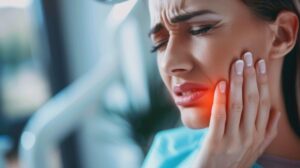
We do a lot of things to prevent emergencies in life, whether it’s driving extra cautiously during rush hour or having a storm shelter in your backyard for when severe weather hits. When it comes to our oral health, though, we often neglect to put the best practices in play to avoid calamity. If you want to sidestep potentially painful and expensive dental emergencies, here are 5 tips to help you!
Tip #1: Practice Good Oral Hygiene
Preventive care is one of the best things you can do to keep your teeth healthy and strong – this can prevent both painful tooth decay and maybe save your teeth the next time you take an open-field tackle. Brush your teeth for two minutes twice a day. Floss once a day and use mouthwash to reach the spaces that your toothbrush can’t. It is also important that you see the dentist twice a year for checkups and cleanings. The dentist can spot issues early and get out ahead of the problem before it progresses.
Tip #2: Wear a Mouthguard
If you’re an athlete, maybe you’ve seen a teammate suffer dental damage because of a ball to the face or a blow to the mouth. The importance of protecting your teeth with a mouthguard can’t be overstated. Mouthguards absorb the force of a hit and can be the difference in keeping your smile intact versus broken or knocked-out teeth. They also act as a barrier between your teeth and your lips, cheeks, and tongue, protecting these soft tissues from injury.
Furthermore, a nightguard can protect your teeth if you unconsciously grind them at night in your sleep, a habit known as bruxism. Grinding and clenching your teeth weakens them, creating a higher risk of an emergency where a tooth is damaged.
Tip #3: Watch Your Diet
Foods high in sugar and starch – like candy, white bread, cereal, baked goods, and snack foods – should be eaten sparingly. Bacteria in the mouth like to consume these properties and create acid as a byproduct, which eats away at the protective covering of your teeth called enamel. Weakened enamel means weaker teeth, and weaker teeth are more prone to lead to breakage and chipping.
You’ll also want to watch out for hard, crunchy, or tough foods like nuts, raw vegetables, beef jerky, and steak. Biting directly into something like an apple has been known to break many weak teeth! Cut these foods into smaller pieces.
Tip #4: Eat Your Vitamins
Daily doses of vitamins keep your teeth and gums healthy and resistant to injury. Vitamin D and calcium help strengthen and stabilize the teeth and jawbone, while Vitamins A, B, and C are excellent for gum health and reduce the risk of gum disease. Fish, eggs, milk, vegetables, and sunlight are just some of the sources of these important vitamins. Of course, you can also visit a health food store or pharmacy to purchase vitamin supplements to take.
Tip #5: Don’t Chew on Things
A lot of people have oral habits like nail-biting or chewing on pen caps and other non-food objects. However, these behaviors can lead to chipped or cracked teeth. To kick these habits, try keeping your hands occupied and opt for sugar-free gum instead—it helps curb the urge to chew and boosts saliva flow, which naturally helps clean away bacteria.
You may not prevent all dental misfortunes, even when you’re careful, but exercising some caution can minimize painful and costly emergencies for your smile!
About the Author
Dr. Jason Daaboul has been practicing dentistry for more than 20 years. He is a graduate of the University of Texas Health Science Center at San Antonio Dental School and has taken dozens of hours of continuing education yearly, often through Spear Education. Additionally, Dr. Daaboul is a member of both the American Dental Association and the Texas Dental Association. If you have a dental emergency, Dr. Daaboul and our team at Daaboul Family, Aesthetic & Implant Dentistry are ready and able to take care of you. Schedule an appointment online or call our Grapevine office at (817) 646-7306.
